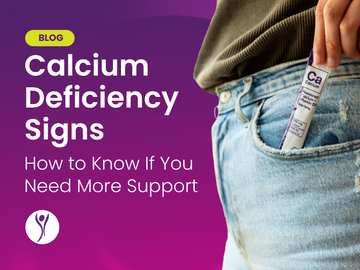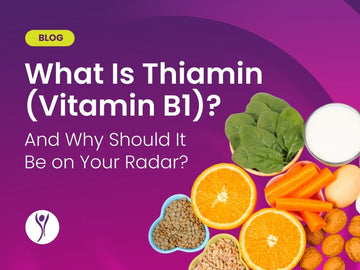by Anthony Benjamin on Nov 08, 2022

Gastric Band Surgery Side-Effects & Vitamins
 As you research the various types of weight loss surgery, it can be scary to think about the various side-effects or risks. It can also be nerve racking to think about the procedure itself.
As you research the various types of weight loss surgery, it can be scary to think about the various side-effects or risks. It can also be nerve racking to think about the procedure itself.
Gastric band surgery is a laparoscopic procedure, which means it is low-risk and only requires small incisions. Let’s take a look at gastric band surgery, some of the side effects, and your vitamin and nutrient needs after surgery.
What is Gastric Band Surgery?
Also known as adjustable gastric banding, gastric band surgery is one of the least invasive types of weight loss surgery. It is a minimally invasive and reversible procedure that decreases the size of the stomach to reduce food intake.
Gastric Band Surgery: How Does It Work?
Before the procedure begins, the surgeon will provide you with anesthesia to ensure you fall asleep and are unable to feel pain. Typically, the procedure takes anywhere from 30 to 60 minutes and will not involve any cutting or stapling inside of your stomach.
To begin, the surgeon will make several small incisions in the abdomen. Through the incisions, they will insert a laparoscope (a small camera) and small instruments inside of your abdomen.
Next, the surgeon will place a band around the upper part of your stomach to separate it from the lower part. They will create a small pouch with a narrow opening that goes into the larger, lower part of your stomach.
The band is made of a special type of rubber. The inside of the band has an inflatable balloon, so it is easily adjustable. In the future, your doctor can loosen or tighten the band, depending on your needs.
When you eat after gastric band surgery, the small pouch will fill up quickly. The food in the small upper pouch will slowly empty into the main part of the stomach, which will help you feel full after eating small amounts of food.
What Happens After the Procedure?
You Have to Follow a Specific Diet
 Unlike other types of weight loss surgery, you will likely go home the day after your procedure. Although most people take a full week off from work, you may be able to resume your normal activities one to two days after returning home.
Unlike other types of weight loss surgery, you will likely go home the day after your procedure. Although most people take a full week off from work, you may be able to resume your normal activities one to two days after returning home.
For the first week or two, you will follow a liquid diet, and your surgeon will provide you with a list of foods you can eat. Slowly, you will be able to add soft foods, then regular foods, into your diet.
After six weeks, you will probably be able to eat regular foods on a normal basis. However, you should still eat small meals, eat slowly, and chew each bite well.
You May Lack Essential Nutrients
Although the procedure does not change the absorption of nutrients in the intestine, it does lead to a loss of nutrition in post-bariatric patients. Essential nutrients, such as vitamin B12, protein, and iron, help your body heal and improve muscle strength, among other benefits.
Apart from following a whole-food diet, you may want to consider taking a daily bariatric-specific supplement to ensure your body is not missing out on essential nutrients.
You Need to be Physically Active
After weight loss surgery, it is possible to regain weight – especially if you are not incorporating physical activity into your daily routine. To avoid this, you need to exercise regularly by working out in a gym or walking a mile every day. You may also want to consider joining a weight loss support group to help you stay motivated and achieve your weight loss goal.
Are You a Candidate for Gastric Band Surgery?
 Gastric band surgery is advised for people who struggle with severe obesity or have tried other weight loss methods without success. Your doctor may suggest gastric banding if:
Gastric band surgery is advised for people who struggle with severe obesity or have tried other weight loss methods without success. Your doctor may suggest gastric banding if:
- You have a BMI of 40 or more. Typically, this means that men are 100 pounds (45 kg) overweight, and women are 80 pounds (36 kg) overweight.
- You have a BMI of 35 or more, and a serious medical condition that may improve with weight loss. Some of these conditions may include sleep apnea, high blood pressure, asthma, heart disease, or type 2 diabetes.
The Advantages of Gastric Band Surgery
If you struggle with obesity, gastric band surgery can provide several benefits, including:
- The possibility of long-term weight loss
- Faster recovery time (when compared to other types of bariatric surgery)
- Reduced risk of wound infections and hernias after surgery
- Reduced risk of diabetes, high blood pressure, and other conditions related to obesity
- Does not interfere with the digestion or absorption of your food
- Future band adjustments
- Improved quality of life
The Disadvantages of Gastric Band Surgery
 As with any medical procedure, there are specific risks associated with gastric band surgery:
As with any medical procedure, there are specific risks associated with gastric band surgery:
- Slower weight loss compared to other types of bariatric surgery
- Potential allergic reactions or breathing problems due to anesthesia
- The stomach can slip up through the band
- Increased risk of gastritis (inflamed stomach lining) or stomach ulcers
- Scarring inside of your stomach
- Bowel blockage
- Vomiting from eating more than the stomach pouch can hold
Your Vitamin and Nutrient Needs After Gastric Band Surgery
After gastric band surgery, there is a dramatic decrease in nutritional intake, which can negatively affect your body and result in inadequate nutrition. If you are a post-bariatric patient, nutrients can also provide the following benefits:
- Help your body heal
- Enhance your quality of sleep
- Strengthens energy levels
- Improves nerve and brain function
- Promotes emotional well-being
- Results in better hormone function
Although you should continue to follow a healthy, whole-food diet, it may be beneficial to incorporate bariatric-specific vitamins, minerals, and protein into your daily routine.
However, it can be stressful and time-consuming to take multiple vitamins per day, which is why ProCare Health has another solution for you: chewable once-daily multivitamins.
Our selection of bariatric-specific vitamins and minerals are easy-to-take, affordable, and designed specifically for weight-loss patients.
A Daily Bariatric Multivitamin
A bariatric-specific multivitamin provides you with adequate B vitamins, folate, zinc, and biotin, and vitamin D. Fortunately, ProCare Health offers several choices of bariatric multivitamins, including once-daily, chewable capsules.
Our once-daily Bariatric Multivitamins are available with or without varying milligrams of iron for people with iron deficiencies or anemia, which is a common issue. We also offer probiotic multivitamin choices.
Calcium with Vitamin D
 Even if you have a sweet tooth, you can still get your daily dose of essential vitamins. ProCare Health’s one-of-a-kind Sea Salted Caramel Calcium Chews are a customer favorite! Made with Trucal®, these are the only all-natural ingredient calcium chew on the market.
Even if you have a sweet tooth, you can still get your daily dose of essential vitamins. ProCare Health’s one-of-a-kind Sea Salted Caramel Calcium Chews are a customer favorite! Made with Trucal®, these are the only all-natural ingredient calcium chew on the market.
ProCare Health is Dedicated to Your Weight Loss Surgery Recovery
At ProCare Health, we know it can be challenging to navigate life after gastric band surgery. We strive to provide you with proper nutrition that is easy-to-take, once-daily, and affordable. We even offer a free sample to help you get started!
Our team of dieticians considers what we do of vital performance to your health, which is why we only provide high-quality, accurate, and bio-available supplements. If you have questions about our bariatric vitamins and supplements, contact us today!

Is Your Body Asking for More Calcium?



